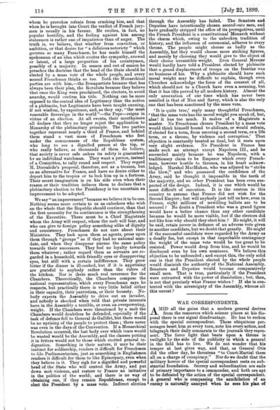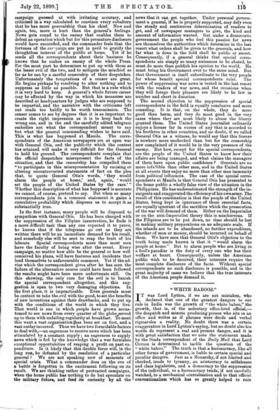WAR CORRESPONDENTS. A MID all the gains that a modern general
derives from the resources which science places at his dis- posal there is one signal disadvantage. He has to reckon with the special correspondent. These ubiquitous per- sonages beset him at every turn, note his every action, and telegraph their daily comments to the journals they repre- sent. The fierce light that beats upon a throne is twilight by the side of the publicity in which a general in the field has to live. We do not wonder that his temper at last gives way, and that, as General Otis did the other day, he threatens "to Court-Martial them all on a charge of conspiracy." Nor do we doubt that the military horror of the special correspondent rests on sub- stantial foundation. Secrecy and subordination are ends of primary importance to a commander, and both are apt to be defeated by the action of the special correspondent. A general who is compassing the annihilation of an enemy is naturally annoyed when he sees his plan of campaign guessed at with irritating accuracy, and criticised in a way calculated to convince every subaltern that he has more generalship than his chief. Now and again, too, more is hurt than the general's feelings. News gets round. to the enemy that enables them to defeat an operation which but for this premature disclosure would have succeeded, and the commander feels that the fortunes of the car,paign are put in peril to gratify the thoughtless interest of the public at home. Yet if he sends all the correspondents about their business he knows that he makes an enemy of the whole Press. For the most part he determines to put up with them as the lesser evil of the two, and to mitigate the mischief so far as he can by a careful censorship of their despatches. Unfortunately the temptations of a censor are great. He begins perhaps by resolving to alter nothing and to suppress as little as possible. But that is a rule which it is very hard to keep. A general's whole future career may be affected by the way in which his measures are described at headquarters by judges who are supposed to be impartial, and the narrative with the criticisms left out reads too baldly to be worth transmission. The censor comes to see by degrees that it is as important to create the right impression as it is to keep back the wrong one, and in the end the carefully edited telegram embodies not what the correspondent meant to say but what the general commanding wishes to have said. This is what has happened at Manila. The corre- spondents of the American newspapers are at open war with General Otis, and the publicity which the contest has attained will make it very difficult for the General to hold his ground. The correspondents complain that the official despatches misrepresent the facts of the situation, and that the censorship has compelled them "to participate in this misrepresentation by excising or altering uncontroverted statements of fact on the plea that, to quote General Otis's words, they would alarm the people at home,' and, again, would set the people of the United States by the ears.' " Whether this description of what has happened is accurate we cannot, of course, pretend to say. But when so many correspondents join in a common statement it gains a cumulative probability which disposes us to accept it as substantially true.
In the first instance, many people will be disposed to sympathise with General Otis. He has been charged with the suppression of the Filipino insurrection, he finds it a more difficult task than any one expected it to prove, he knows that if the telegrams go out as they are written there will be an immediate demand for his recall, and somebody else will be sent to reap the fruit of his labours. Special correspondents more than most men have the faculty of being wise after the event. Every campaign, no matter how able be the general or how well conceived his plans, will have features and incidents that lend themselves to unfavourable comment. Yet if the ad- vice which the correspondent gives after he has seen the failure of the alternative course could have been followed the results might have been more unfortunate still. On this showing, the only cure for the evil is to banish the special correspondent altogether, and this sug- gestion is open to two very damaging objections. In the first place, it is impracticable. Even generals must be content to take the evil with the good, to set the benefits of new inventions against their drawbacks, and to put up with the conditions of the world in which they live. That world is one in which people have grown accus- tomed to see news from every quarter of the globe served up to them with unfailing regularity at breakfast. To meet this want a vast organisation has been set on foot, and a vast outlay incurred. Thus we have two formidable factors to deal with,—an eagerness to receive news which has been stimulated by a constant supply ; an eagerness to supply news which is fed by the knowledge that a war furnishes exceptional opportunities of reaping a profit on past ex- penditure. Is it likely that this double force will, in the long run, be defeated by the resolution of a particular general ? We are not speaking now of moments of special crisis. What a. commander does on the eve of a battle is forgotten in the excitement following on its result. We are thinking rather of protracted campaigns, when the home public has nothing to do but speculate on the military future, and feed its cariosity by all the news that it can get together. Under personal govern- ment a general. if he is properly supported, may defy even the steady and continuous determination of readers to get, and of newspaper managers to give, the kind and amount of information wanted. But under a democratic government the people who feel this passion for news are themselves the authorities which determine in the last resort what orders shall be given to the generals, and how far what is done in the field shall be public or secret. Consequently, if a general thinks that special corre- spondents are simply so many nuisances to be abated, he must do more than publish his opinion to the world. He must bring his Government over to the same mind. But that Government is itself subordinate to the very people for whose benefit special correspondents exist. The power of suppressing war news is vested in the last resort with the readers of war news, and the occasions when they will forego their pleasure are likely to be few in number and short in duration.
The second objection to the suppression of special correspondents in the field is equally conclusive and more consoling. It is that, on the whole, they do more good than harm, and they do most good in the very cases where they are most likely to abuse the liberty granted them. The United States journalist ordinarily enjoys a license far in excess of any that is accorded to his brethren in other countries, and uo doubt, if we called General Otis as a witness, he would say that this license is nowhere more unchecked than but for the censorship now complained of it would be in the very presence of the enemy. But how, except for the special correspondents, are the people of the United States to know how their affairs are being managed, and what claims the managers of them have upon public confidence ? Generals are no more infallible than other men, and in the United States at all events they enjoy no more than other men immunity from political influences. The case of the special corre- spondents at Manila is that General Otis has presented to the home public a wholly false view of the situation in the Philippines. He has underestimated the strength of the in- surgents and exaggerated the efficiency of his own army. The result of this combination is that the people of the United States, being kept in ignorance of these essential facts, are equally ignorant of the sacrifices which the prosecution of the war will demand of them. Either on the Imperialist or on the anti-Imperialist theory this is mischievous. If the Filipinos are to be put down, no time should be lost in making military preparations on an adequate scale. If the islands are to be abandoned, no further expenditure, whether of men or money, should be incurred on behalf of them. We have seen that General Otis's objection to the truth being made known is that it "would alarm the people at home." But to alarm people who are living in a fool's paradise is the duty of every one who has their welfare at heart. Consequently, unless the American public wish to be deceived, their interests require the most complete disclosure of the facts. Without special correspondents no such disclosure is possible, and in the great majority of cases we believe that the true interests of the American people demand it.



































 Previous page
Previous page